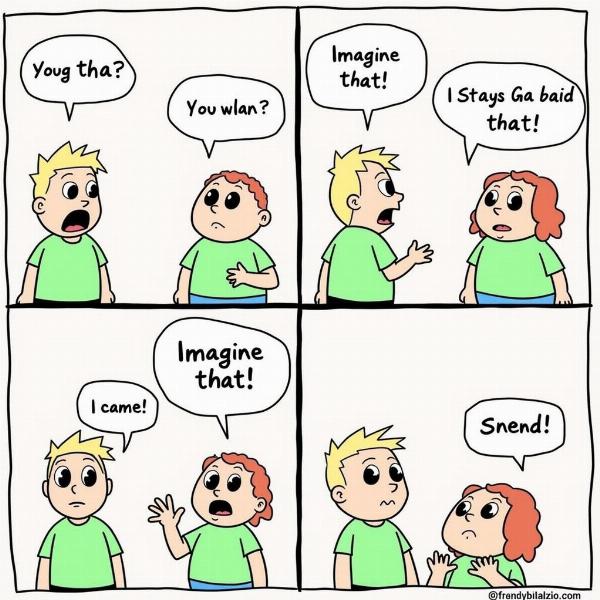Imagine, a word brimming with potential, often leaves us wondering about its equivalent in Hindi. Understanding “imagine ka hindi meaning” opens up a world of creative expression and deeper cultural understanding. This article will explore the various Hindi translations of “imagine,” delving into their nuances and contextual usage. We will also discuss the significance of imagination in Indian culture and its portrayal in literature and arts.
Decoding “Imagine” in Hindi
The most common Hindi translations for “imagine” are कल्पना करना (kalpana karna), सोचना (sochna), and मान लेना (maan lena). While these words share the core concept of envisioning something, they differ in their specific implications. कल्पना करना (kalpana karna) implies a more creative and imaginative process, often used in the context of art, literature, and dreams. सोचना (sochna), on the other hand, refers to general thinking and considering, encompassing a broader range of mental processes. मान लेना (maan lena) suggests assuming or supposing something, focusing on accepting a hypothetical scenario. Choosing the most accurate translation depends heavily on the specific context.
Exploring the Nuances: कल्पना, सोचना, and मान लेना
Let’s delve deeper into the nuances of these Hindi words. कल्पना (kalpana) often carries a connotation of fantasy and creativity. Think of a poet crafting verses or a painter visualizing a masterpiece. This word perfectly captures the act of bringing something new into existence through the power of thought. सोचना (sochna), while encompassing imagination, is more general. It can refer to pondering a problem, reflecting on an experience, or simply thinking about daily tasks. It is the Hindi equivalent of “thinking” in its broadest sense. मान लेना (maan lena) implies accepting a premise for the sake of argument or discussion. It is often used in hypothetical situations, such as “imagine if we could fly.”
The Role of Imagination in Indian Culture
Imagination holds a significant place in Indian culture, deeply intertwined with spirituality, storytelling, and artistic expression. From ancient myths and epics to contemporary literature and cinema, imagination has shaped the cultural landscape of India. The rich tapestry of Hindu mythology, with its vibrant deities and fantastical narratives, is a testament to the power of imagination.
Imagine in Everyday Conversations
How do we use these words in everyday conversations? If you’re discussing a novel, you might say, “उसने एक अद्भुत दुनिया की कल्पना की है” (Usne ek adbhut duniya ki kalpana ki hai) – “He has imagined a wonderful world.” If you’re pondering a solution, you could say, “मैं इस समस्या के बारे में सोच रहा हूँ” (Main is samasya ke bare mein soch raha hun) – “I am thinking about this problem.” In a hypothetical situation, you might say, “मान लीजिए कि आप प्रधानमंत्री होते” (Maan lijiye ki aap pradhan mantri hote) – “Imagine if you were the Prime Minister.”
How would you say “Imagine that!” in Hindi?
“Imagine that!” in Hindi can be expressed in several ways, depending on the context. You could say “सोचो तो!” (Socho to!), “कल्पना करो!” (Kalpana karo!), or “ज़रा सोचिए!” (Zara sochiye!). These expressions convey surprise or disbelief, similar to the English phrase.
 Imagine That in Hindi
Imagine That in Hindi
Conclusion: Embracing the Power of कल्पना
Understanding “imagine ka hindi meaning” empowers us to engage with Hindi language and Indian culture on a deeper level. Whether it’s crafting a story, pondering a problem, or simply daydreaming, the ability to imagine is a powerful tool. By exploring the nuances of कल्पना करना (kalpana karna), सोचना (sochna), and मान लेना (maan lena), we unlock a world of creative expression and cross-cultural understanding.
FAQ:
- What is the most accurate Hindi translation for “imagine”? The most accurate translation depends on the context. कल्पना करना (kalpana karna) is best for creative imagination, सोचना (sochna) for general thinking, and मान लेना (maan lena) for hypothetical situations.
- How is imagination viewed in Indian culture? Imagination is highly valued in Indian culture, playing a crucial role in spirituality, storytelling, and artistic expression.
- Can you give an example of “imagine” in a Hindi sentence? “उसने एक सुंदर भविष्य की कल्पना की” (Usne ek sundar bhavishya ki kalpana ki) – “She imagined a beautiful future.”
- How do I use “imagine” in casual Hindi conversations? You can use phrases like “सोचो तो!” (Socho to!) or “कल्पना करो!” (Kalpana karo!) to express surprise or disbelief.
- What are some other words related to “imagine” in Hindi? Other related words include विचार (vichar – thought), स्वप्न (swapna – dream), and धारणा (dharana – notion).
Meaning-Hindi.in is your trusted partner for professional Hindi translation services. We offer a wide range of specialized translation solutions, including business and commercial document translation, legal and certified translation, technical and user manual translation, website and software localization, educational and academic translation, and express translation services. Our team of expert linguists ensures accurate and culturally sensitive translations for your specific needs. Contact us today for a free quote: Email: [email protected], Phone: +91 11-4502-7584. Let Meaning-Hindi.in bridge the language gap for you.